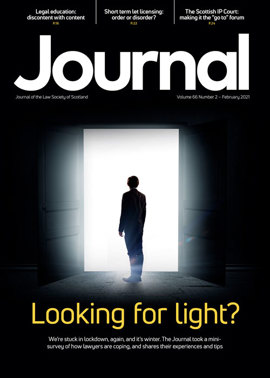The Scottish “IP Court”: the case for reform

Caroline Pigott, convener, IP Committee:
The ability to protect intellectual property (IP) is vital to scientific and technological innovation and those in creative industries. It plays a hugely important role in the Scottish economy by ensuring creators can exercise certain rights to safeguard the integrity of their work and see a return for the investment of their intellectual creation.
It might therefore be expected that IP cases would frequently come before the Scottish courts. However, research published in 2017 by Jane Cornwell (senior lecturer at the University of Edinburgh and currently a member of the Law Society of Scotland’s IP Committee) showed that case volumes were relatively low, with some important sectors, such as the creative industries and life sciences, not well represented (Journal, September 2017, 18). The research highlighted potential loss of business to courts in other jurisdictions, with intra-UK jurisdictional competition with the English courts a particular consideration. While participants noted that the Court of Session does offer a good forum for IP litigation, there was also a clear interest in updating its IP rules to increase competitiveness in the IP litigation marketplace.
There has been a feeling over the past few years that the current court processes could be improved to enhance the ability to enforce rights and to boost Scotland’s reputation as a venue for IP rights enforcement. It is also important to ensure that a sufficient number of cases come before the Scottish courts for judges to demonstrate and enhance their ability to decide on complex IP issues. Members of the committee identified absence of discovery, ability to obtain interim interdicts and the Scottish system of pleadings as existing advantages. However, looking to the Intellectual Property & Enterprise Court (IPEC) in England & Wales as a comparator, the cost cap and two-day timeframe there are seen as attractive, particularly in terms of ascertaining risk profile.
When we heard that Colin Hulme and Usman Tariq were leading a project on this topic, we were keen to engage. Last spring we were pleased to welcome them to discuss the reform proposals.
Colin Hulme, co-author:
We have submitted a paper to the Scottish Civil Justice Council asking it to consider proposals for reform of the practice of IP litigation in the Court of Session.
Our proposals (see panel) call for reforms to the Rules of the Court of Session to ensure that Scotland will be seen as an attractive jurisdiction for the resolution of IP disputes. In particular, it is clear to us that improvements can and need to be made to enable us to offer a satisfactory alternative to IPEC and other parts of the High Court of England & Wales. Considerable investment has made England a very attractive jurisdiction for the resolution of IP disputes. We seek to make changes here to enable us to offer a suitable alternative and to improve access to justice for Scottish rights-holders.
Neeraj Thomas, IP committee member:
We agree with the central objectives of the reforms. It is important for this jurisdiction to consider how it can increase its competitiveness in the IP disputes landscape. There are two aspects to this: (1) considering whether there is an unmet need in the form of SMEs and individuals who feel unable to enforce their IP rights in the Court of Session and whether the IPEC model can be replicated in Scotland to open up IP litigation to this constituency; and (2) considering how to retain IP disputes of any size in Scotland and attract cross-border disputes to Scotland.
The success of IPEC has wider significance for this jurisdiction. Often a litigant will have a jurisdictional choice in IP disputes between raising proceedings in Scotland or England & Wales. This is particularly the case where there has been cross-border infringement (e.g. online) or there is a validity challenge to a registered IP right. This should be seen as an opportunity to attract more IP disputes to this jurisdiction.
But competition works both ways: as Jane Cornwell said in her research, Scotland could be described as a “porous” jurisdiction, potentially losing IP business to other jurisdictions.
There are a number of reasons which may have contributed to this view, including: increased jurisdictional flexibility among practitioners as a growing number of Scottish firms have merged with English or international firms in recent years; a perception of London as the UK’s IP litigation hub; the success of IPEC in reducing costs and narrowing Scotland’s competitive advantage in terms of expense; Scottish patent and trade mark attorneys tending to refer disputes to IPEC; and concerns about the relative inexperience of this jurisdiction in dealing with complex IP disputes.
Proposals must work in practice as well as sounding good on paper. With that in mind, Colin Hulme and Usman Tariq have consulted widely and it is to their credit that these changes were almost universally supported by stakeholders. There was general support for the recommendation of introducing an IPEC-style procedure in Scotland, as well as better promoting IP litigation in Scotland. As this is such an important issue, the IP Committee’s own recommendation for endorsement was referred up to and formally approved by the Society’s Public Policy Committee.
Colin Hulme:
Our proposals focus on specific improvements which can be made to attract IP disputes to the Court of Session without the need for legislation. These are practical reforms which can be made within the existing infrastructure to adapt chapter 55 of the Rules of the Court of Session, dealing with IP actions, to meet the current challenges to our jurisdiction. We are not proposing the creation of a new court, but rather to introduce IPEC-style procedure in the Court of Session to facilitate better branding and promotion of the IP Court. In the longer term we consider there is a strong case for removing IP actions from the rules of privative jurisdiction of the Court of Session, but such a change might require legislation and we do not wish our more attainable recommendations to be held up by such an obstacle.
There are many reasons to be proud of existing Scottish IP litigation practice. However, continual evolution of our IP disputes landscape is vital to meet the increasing challenges to our jurisdiction and improve access to justice for Scottish rights-holders. The IPEC provides a model for reform of the Scottish IP Court, but also poses a significant competitive challenge: it is imperative to learn from its success.
Neeraj Thomas:
The IP Committee welcomes the practical approach in the paper, which incorporates some of the key benefits from the IPEC model. In particular, if practical to do so, the appointment of a single judge (perhaps with the appointment of a deputy to deal with absence or other levels of activity) to manage and hear all IP disputes brought before the Court of Session would allow for a concentration of experience and expertise. Additionally, having a single person responsible for the management of these cases would likely mean that such a nominated IP judge would be in a better position to take ownership of the practice of IP litigation, as has been the case with the presiding judge in IPEC. The increased case management in IPEC has a significant impact on the conduct of parties and their representatives in proceedings.
We were also particularly attracted to the introduction of a Scottish equivalent to an English Norwich Pharmacal order. There is no doubt that an increasingly urgent issue in the protection of IP rights is the need to identify the party infringing them while hiding behind an online pseudonym or other anonymous means. At present there are very limited measures available in Scotland to enable such unknown infringers to be identified without commencing court proceedings. Indeed, this could well be a proposal which it would be worth introducing more broadly, for example in areas such as online defamation.
Caroline Pigott:
It is important for both domestic and international stakeholders, perhaps particularly SMEs and individuals who may have more limited resources, to ensure that our court processes are as user-friendly as possible and offer practical and commercial solutions so IP rights-holders can effectively and efficiently enforce those rights. Overall, the Law Society of Scotland confirms its support and considers that the adoption of these proposals would support the core objectives of improving the attractiveness of Scotland as an international venue for IP dispute resolution and increasing access to justice for Scottish IP rights-holders.
Key proposals
The main proposals of the Hulme and Tariq paper are:
- introduction of an optional “costs cap” of £50,000, meaning that the successful party in an IP action can recover no more than £50,000 by way of expenses. This should offer a degree of costs protection for those wishing to litigate over IP disputes;
- development of a simplified process for smaller IP claims, so that they can be dealt with in a more streamlined way;
- nomination of a single IP judge so that all IP cases in the Court of Session go before one IP judge, who would have ownership for the conduct of these cases and increase judicial management of IP cases coming before the court;
- introduction of an order equivalent to a Norwich Pharmacal order, which allows for identification of parties hidden behind social media profiles; and
- better promotion of the Court of Session as an IP court so that those with rights to enforce would be encouraged to use the court, as opposed to not litigating or litigating elsewhere.
Regulars
Perspectives
Features
Briefings
- Criminal court: Discount season
- Family: Capital values in uncertain times
- Employment: Can employers require staff vaccination?
- Human rights: Protecting the child claimant
- Pensions: a bill with teeth
- Charities: commerce as public benefit?
- Property: Playing safe: on the right track?
- In-house: Wide world of in-house
In practice
- Priorities for our Parliament
- The Word of Gold: The gift that keeps on giving
- TRS: more trusts, more information, more access
- A proper conclusion
- The Eternal Optimist: Putting resolve into resolutions
- Appreciation: Professor Emeritus Robert Rennie
- Ask Ash: Trainee in a rut
- Royal Faculty invites new members






